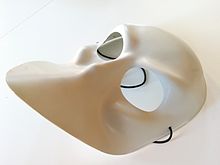Sleep No More (2011 play)
| Sleep No More | |
|---|---|

One of the audience masks used in the production.
|
|
| Written by | Punchdrunk |
| Directed by | Felix Barrett and Maxine Doyle |
| Date premiered | March 7, 2011 |
| Place premiered | McKittrick Hotel, 530 West 27th Street, New York City |
| Original language | English (mostly mute) |
| Setting | McKittrick Hotel and environs, Gallow Green, Glamis, Forfar, Scotland |
| Official site | |
Sleep No More is the New York City production of a site-specific work of theatre created by British theatre company Punchdrunk, primarily based on William Shakespeare's Macbeth, with inspiration also taken from noir films (especially those of Alfred Hitchcock), as well as some reference to the 1697 Paisley witch trials. It is expanded from their original 2003 London incarnation (at the Beafoy Building) and their Brookline, Massachusetts 2009 collaboration with Boston's American Repertory Theatre (at the Old Lincoln School). The company reinvented Sleep No More as a co-production with Emursive, and began performances on March 7, 2011. Sleep No More won the 2011 Drama Desk Award for Unique Theatrical Experience and won Punchdrunk special citations at the 2011 Obie Awards for design and choreography.
Sleep No More adapts the story of Macbeth, deprived of nearly all spoken dialogue and set primarily in a dimly-lit, 1930s-era establishment called the "McKittrick Hotel": the website of which claims it has been recently "restored" but is actually a block of warehouses in Manhattan's Chelsea neighborhood, transformed into a hotel-like performance space. Sleep No More's presentational form is considered promenade theatre, in which the audience walks at their own pace through a variety of theatrically designed rooms, as well as environmental theatre, in which the physical location, rather than being a traditional playhouse, is an imitation of the actual setting. It is also best described as immersive theatre, rather than interactive theatre, because although the audience may move through the settings, interact with the props, or observe the actors at their own pace, their interference has no bearing on the story or the performers except in rare instances.
...
Wikipedia
